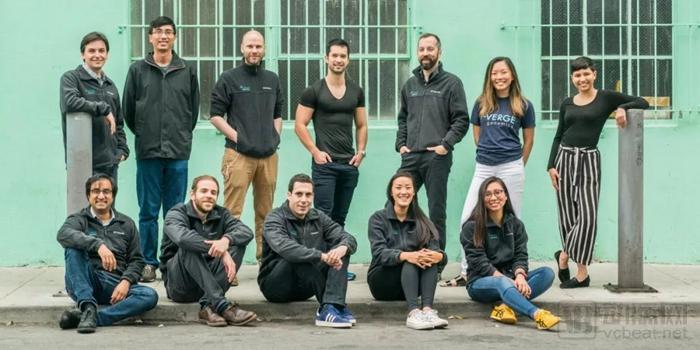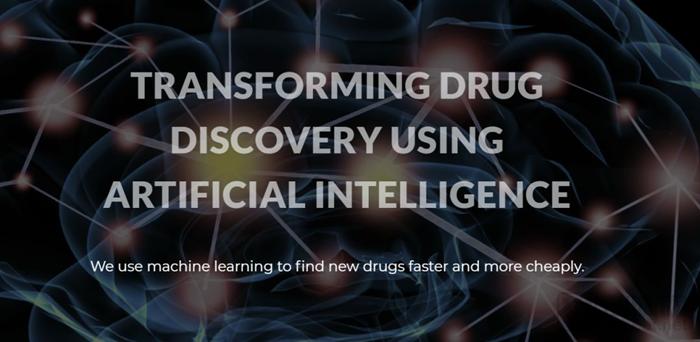Weizhi Gene recently completed a $32 million Series A financing, leading AI-driven drug development
Verge Genomics, a drug development company that uses machine learning to develop new therapies, recently announced the completion of a $32 million Series A round of financing, led by DFJ Ventures, and other participants including PharmaTech Venture Capital, ALS Investment Innovative biotech investment institutions such as Fund, Agent Capital and OS Fund. According to the arterial network, Verge Genomics has accumulated more than $36 million in financing.
Take the lead, start with machine learning
Founded in 2015, Verge Genomics in San Francisco is a company that combines machine learning, neuroscience, and experimental biology to drive drug discovery. There are now 15 people on Verge's team, most of whom are PhDs from UCLA, Stanford, Oxford and UCSF. Their areas of interest include machine learning, neuroscience, drug discovery, applied mathematics, biophysics, and data science. In addition, Verge has a Scientific Advisory Board and a Strategic Advisory Board. Members include the world's top scientists and research scholars. A good team helps Verge accelerate the process of drug research from theory to clinical practice.
Alice Zhang, CEO and co-founder of Verge Genomics, graduated from Princeton University and then entered the laboratory of Daniel Geschwind, a professor of neurogenetics at UCLA. During this period, the rapid development of machine learning technology and the explosive growth of genomics data left a deep impression on her. “We are at a unique moment,†Alice said. “Before, we thought that some diseases were too complicated to solve. But now, we finally have tools to solve them.â€
So Alice decided to abandon her degree and build a scalable drug development engine to develop innovative, personalized therapies for complex diseases through machine learning. She co-founded Verge Genomics with JASON CHEN, who studies biomedical engineering. And it is supported by Y Combinator, a famous American startup incubator.
“I think it was a unique point in time. We are going through a revolution, and getting started is the key,†Alice said. “I am very pleased that Verge Genomics is one of the first companies to combine neuroscience and genomics to develop new drugs. Thanks to his outstanding achievements and great potential in the biomedical industry, Alice was elected as "Forbes" magazine "30 Under 30" (30 Under 30) and "MIT Technology Review" "Technology Innovation under 35" (35 Innovators Under 35).

(Alice Zhang, CEO and co-founder of Verge Genomics)
For the theoretical foundation of corporate research, Alice explained, “The disease is affected by multiple genes. Most drug research has failed because researchers focus on only one gene at a time.†Using artificial intelligence tools, in large numbers Finding potential therapeutic molecules in the data can help develop new therapies, especially some neurodegenerative diseases such as Alzheimer's disease, Parkinson's syndrome, and amyotrophic lateral sclerosis (ALS).
Current or traditional drug research models are like guessing games. Alice believes that although these models have helped some of the previous diseases, major diseases such as Alzheimer's disease are too complicated to find solutions by accidental discovery alone.
Verge's approach is to analyze hundreds of interacting genes that cause a disease by analyzing large amounts of data about DNA, RNA, and proteins, and then develop drugs that solve all genetic problems at once. This seems to be an ambitious plan. But Verge has made some progress in this area by combining genomic data, artificial intelligence and the technology that Google search engines rely on.
For Alice, these tools can help her better understand the diversity of human brain structures and more advanced data sets. These calculated predictions and a large amount of data can in turn improve Verge's patterns and algorithms, which is the overall concept of machine learning.
Alice said, “We pass the calculated predictions through a human drug monitoring platform for internal preclinical models.†This means that Verge will use human data throughout the process, rather than relying on animal data before clinical trials. .
Currently, Verge has completed the stages of data collection, targeted R&D and small molecule therapy for ALS's leading projects. In the "frozen human disease" model, Verge's seven molecules have been able to slow cell death in vitro.
Multi-party cooperation, looking for new treatments for complex diseases
Biopharmaceutical companies want to bring new changes to the field of drug therapy, and neurodegenerative diseases are a good entry point, and this is where Alice specializes. After nearly three years of rapid development, Verge has signed agreements with two large pharmaceutical companies to study depression depression and cerebral amyloid angiopathy. Verge is also working with some of the top academic institutions and government organizations to build proprietary databases that make it the most comprehensive genetic database for patients with Parkinson's syndrome and ALS.

(Verge team, picture from Verge Genomics)
In September 2017, Verge announced a collaboration with Columbia University's Motor Neuron Center, the Massachusetts General Institute for Neurodegenerative Disease, the University of Southern California's Keck Medical Center, and the Department of Neurology at the University of Michigan Medical School to bring Verge's patient gene database and inductivity. The pluripotent stem cell (iPSC) model, along with some advanced imaging techniques, combine to establish a link between patient disease research and preclinical models.
In November 2017, Verge announced a partnership with the National Human Genome Research Institute of the National Institutes of Health (NIH), the Scripps Research Institute, and the Dresden University of Technology. These academic institutions provide a large number of Parkinson patient samples and preclinical models. Verge uses genomic analysis and data generation to determine the best preclinical model to enter the clinical phase, while developing innovative therapies. In addition, Verge has planned more than a dozen new treatments for six different diseases.
In January 2018, Verge announced a partnership with technology company Datavant. This is also the first time Verge has been involved in the field of drug data. Datavant's main business is to integrate medical data from around the world, through artificial intelligence, to help design and explain clinical trials, increase its success rate, and enable more drugs to enter the clinical stage. Travers May, president and co-founder of Datavant, said, "Verge's data and expertise in computational biology has provided a solid foundation for the design of clinical trials, and we are pleased to work with Verge to accelerate drug research."
In March 2018, Verge announced the development of a single-cell genome for Parkinson's disease to establish the first data set in this field. The project was led by Verge, and the partners include UC San Diego and the life sciences research institute VIB in Belgium. Alice said, "This collaboration will help Verge to further build high-quality databases through computational analysis. Tripartite can provide expertise in neurobiology, single-cell sequencing and machine learning to create a correct database and turn on medical care. New breakthrough."
AI opens a new era of drug development
Alice said, "At Verge, we believe that bridging the gap between industry, academia, computing and biology is critical to fully exploiting the potential of AI in drug research."
“By combining machine learning with drug research, we are able to develop innovative treatments for major diseases faster, such as Parkinson's syndrome and ALS. We want investors to understand this interdisciplinary mindset. I am happy to see investors from biotechnology and technology support us. We will use this money to advance the most promising drug research into the clinical stage. At the same time, we will continue to expand our proprietary database and explore More treatment options."
Emily Melton from DFJ said, "The volume of data related to machine learning has grown dramatically, allowing us to see potential opportunities to reform drug development. Verge Genomics' excellent interdisciplinary team and their ideas have influenced us, technology and The combination of neurobiology to develop innovative therapies for complex diseases."
Edward Hu, chief financial officer and chief investment officer of WuXi AppTec, said, "Verge has built one of the most comprehensive databases in the world, which combines disease research, machine learning and artificial intelligence. We chose to invest in Verge. , aiming to participate in the field of using artificial intelligence and machine learning to develop drugs."

(Image courtesy of Verge Genomics)
As a typical representative of the digital innovation of the pharmaceutical industry, Verge's investment in well-known venture capital funds once again reminds the trend of innovative medicine industry to embrace artificial intelligence (AI) and other technologies across the border. Innovative pharmaceutical companies are entering a new era of relying on AI competency. It is worth paying attention to investors in the fields of medicine and life sciences.
AI drug research and development as an emerging field, there are currently more than a dozen representative companies in the world are trying different technical directions, IBM Watson Health may be the most well-known, in addition to the Wisdom gene, including the United States Atomwise, Berg Health, Insilico Medicine, NuMedii, Numerate, Recursion Pharmaceuticals, TwoXAR; British BenevolentAI, Exscientia; China's Accutar Biotech (AccutarBio), Jingtai Technology (XtalPi).
At the beginning of this year, Jingtai Technology, a domestic AI drug research and development company, completed about $15 million in Series B financing, led by Sequoia Capital China Fund, Google and investment, and the last round of investor Tencent added investment. In March, Atomwise, a company committed to improving the efficiency of new drug research and development with AI, announced that it has completed a $45 million Series A round of financing. The leading investors are Monsanto Growth Ventures, DCVC (Data Collective) and B Capital Group. Investors also include Baidu Ventures. Tencent, early investor Y Combinator, etc.
In April, Biotech's “unicorn†BenevolentAI announced a $115 million financing from new and existing investors, bringing the company's valuation to $2.1 billion. For innovative pharmaceutical companies, continuous R&D investment is almost the only way to maintain long-term competitiveness. In 2017, the R&D funds invested by the top ten pharmaceutical companies in the world's R&D investment accounted for more than 20% of sales revenue, up to 45.5%.
Overall, AI tools are becoming more widely used in the pharmaceutical industry and are an important part of the digital transformation of the pharmaceutical industry, which will reshape the pharmaceutical industry.
Tetanus Shot,Tetanus Vaccine,Hepatitis B Injection,Hep B Vaccine
FOSHAN PHARMA CO., LTD. , https://www.pharmainjection.com